CRIM1004: Psychological Positivism Theory and the Australian CJS
VerifiedAdded on 2023/06/10
|10
|2471
|169
Report
AI Summary
This report provides an in-depth analysis of psychological positivism within the field of criminology, focusing on its definition, causes of crime, and methods of combating it. It explores how the theory influences the current Australian Criminal Justice System (CJS), providing specific examples of its application. The report also assesses the relevance of psychological positivism in contemporary society, considering both its strengths and criticisms. The study examines the concept of 'mens rea' and its importance in determining criminal intent, as well as the influence of psychological factors on criminal behavior. Furthermore, it discusses the relevance of the theory by considering the influence on the Australian CJS. It also evaluates the criticisms, offering a comprehensive understanding of the theory's impact and limitations. This report provides a detailed overview of the theory's evolution, application, and ongoing relevance in the context of the Australian legal system.
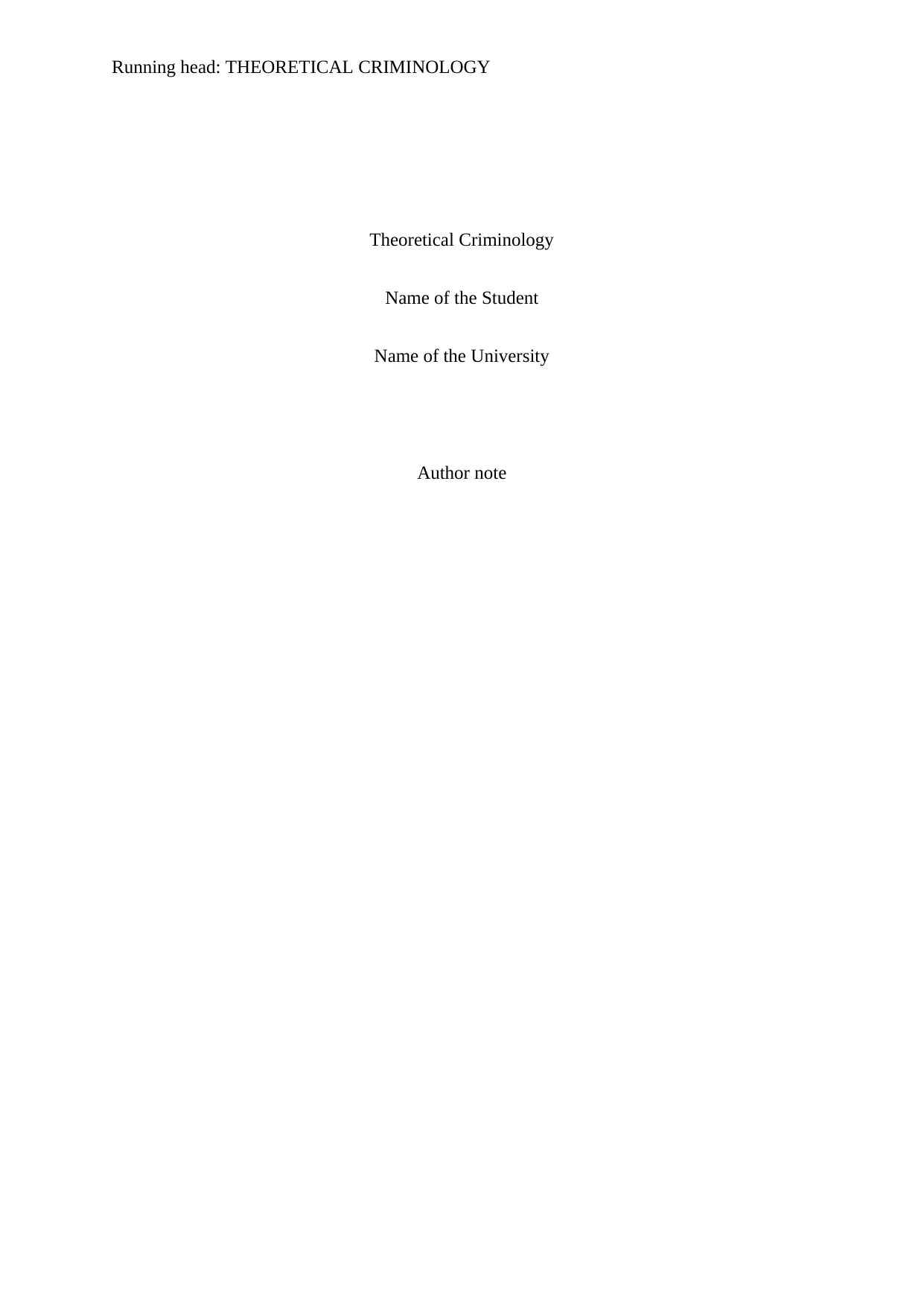
Running head: THEORETICAL CRIMINOLOGY
Theoretical Criminology
Name of the Student
Name of the University
Author note
Theoretical Criminology
Name of the Student
Name of the University
Author note
Paraphrase This Document
Need a fresh take? Get an instant paraphrase of this document with our AI Paraphraser
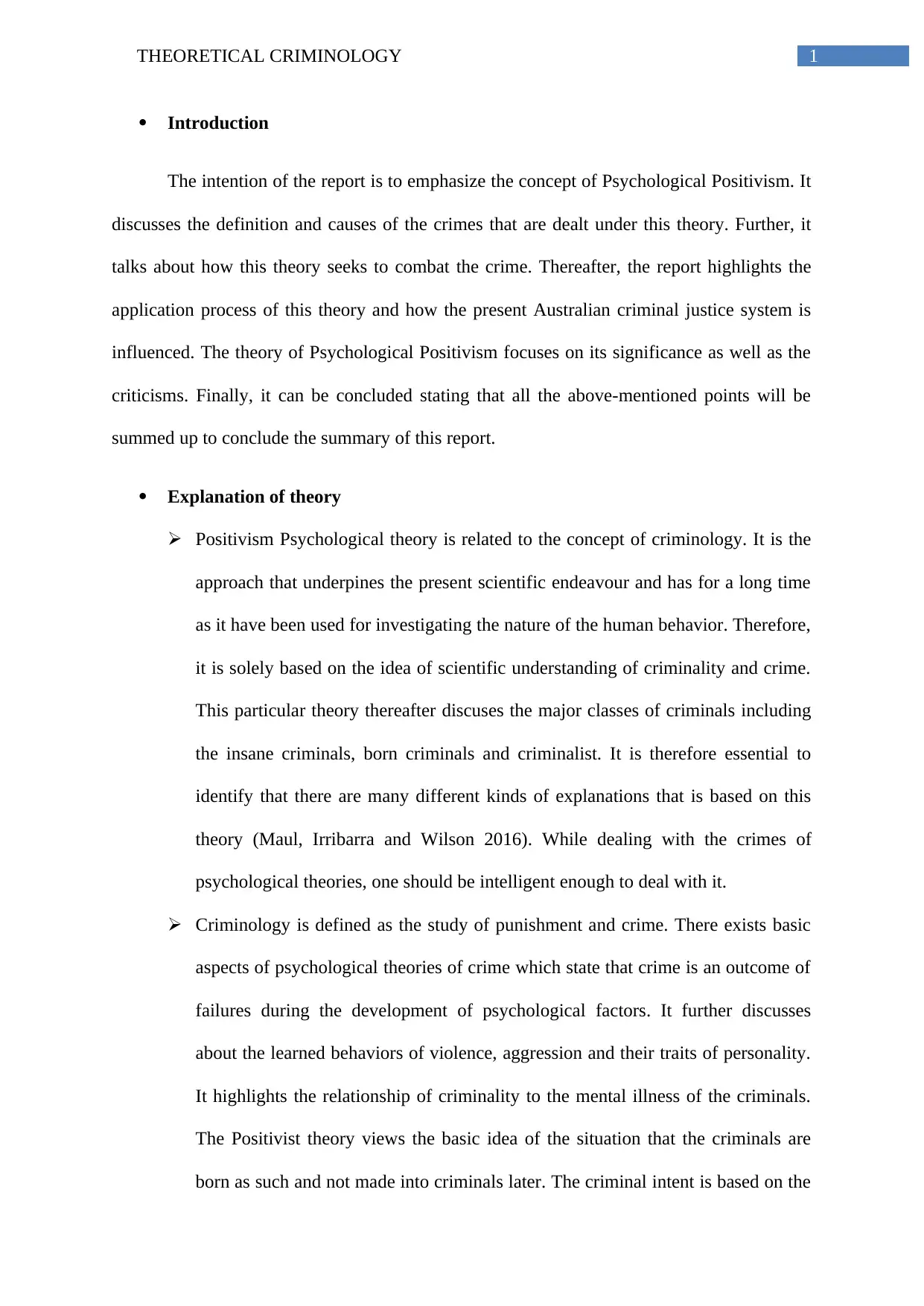
1THEORETICAL CRIMINOLOGY
Introduction
The intention of the report is to emphasize the concept of Psychological Positivism. It
discusses the definition and causes of the crimes that are dealt under this theory. Further, it
talks about how this theory seeks to combat the crime. Thereafter, the report highlights the
application process of this theory and how the present Australian criminal justice system is
influenced. The theory of Psychological Positivism focuses on its significance as well as the
criticisms. Finally, it can be concluded stating that all the above-mentioned points will be
summed up to conclude the summary of this report.
Explanation of theory
Positivism Psychological theory is related to the concept of criminology. It is the
approach that underpines the present scientific endeavour and has for a long time
as it have been used for investigating the nature of the human behavior. Therefore,
it is solely based on the idea of scientific understanding of criminality and crime.
This particular theory thereafter discuses the major classes of criminals including
the insane criminals, born criminals and criminalist. It is therefore essential to
identify that there are many different kinds of explanations that is based on this
theory (Maul, Irribarra and Wilson 2016). While dealing with the crimes of
psychological theories, one should be intelligent enough to deal with it.
Criminology is defined as the study of punishment and crime. There exists basic
aspects of psychological theories of crime which state that crime is an outcome of
failures during the development of psychological factors. It further discusses
about the learned behaviors of violence, aggression and their traits of personality.
It highlights the relationship of criminality to the mental illness of the criminals.
The Positivist theory views the basic idea of the situation that the criminals are
born as such and not made into criminals later. The criminal intent is based on the
Introduction
The intention of the report is to emphasize the concept of Psychological Positivism. It
discusses the definition and causes of the crimes that are dealt under this theory. Further, it
talks about how this theory seeks to combat the crime. Thereafter, the report highlights the
application process of this theory and how the present Australian criminal justice system is
influenced. The theory of Psychological Positivism focuses on its significance as well as the
criticisms. Finally, it can be concluded stating that all the above-mentioned points will be
summed up to conclude the summary of this report.
Explanation of theory
Positivism Psychological theory is related to the concept of criminology. It is the
approach that underpines the present scientific endeavour and has for a long time
as it have been used for investigating the nature of the human behavior. Therefore,
it is solely based on the idea of scientific understanding of criminality and crime.
This particular theory thereafter discuses the major classes of criminals including
the insane criminals, born criminals and criminalist. It is therefore essential to
identify that there are many different kinds of explanations that is based on this
theory (Maul, Irribarra and Wilson 2016). While dealing with the crimes of
psychological theories, one should be intelligent enough to deal with it.
Criminology is defined as the study of punishment and crime. There exists basic
aspects of psychological theories of crime which state that crime is an outcome of
failures during the development of psychological factors. It further discusses
about the learned behaviors of violence, aggression and their traits of personality.
It highlights the relationship of criminality to the mental illness of the criminals.
The Positivist theory views the basic idea of the situation that the criminals are
born as such and not made into criminals later. The criminal intent is based on the
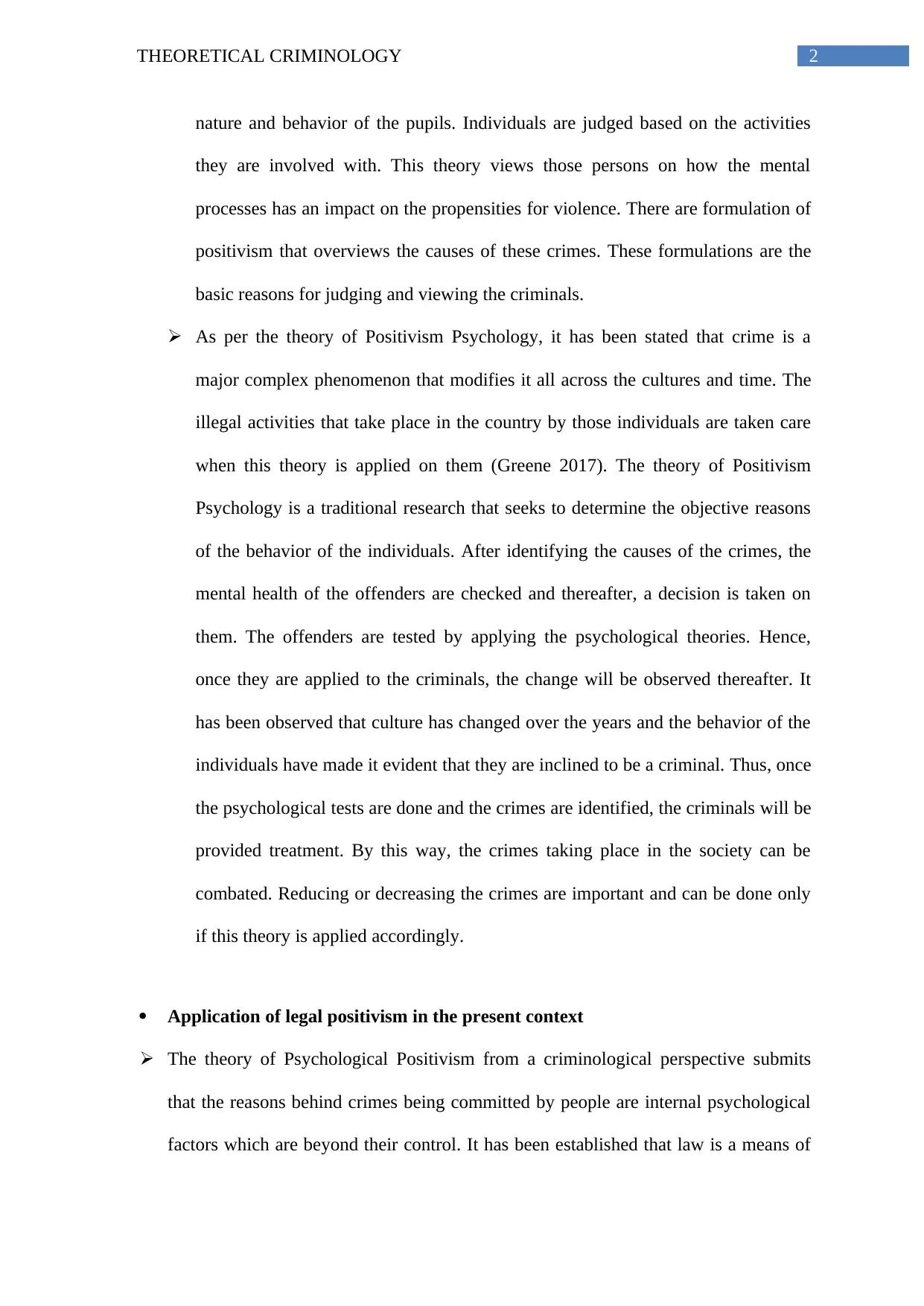
2THEORETICAL CRIMINOLOGY
nature and behavior of the pupils. Individuals are judged based on the activities
they are involved with. This theory views those persons on how the mental
processes has an impact on the propensities for violence. There are formulation of
positivism that overviews the causes of these crimes. These formulations are the
basic reasons for judging and viewing the criminals.
As per the theory of Positivism Psychology, it has been stated that crime is a
major complex phenomenon that modifies it all across the cultures and time. The
illegal activities that take place in the country by those individuals are taken care
when this theory is applied on them (Greene 2017). The theory of Positivism
Psychology is a traditional research that seeks to determine the objective reasons
of the behavior of the individuals. After identifying the causes of the crimes, the
mental health of the offenders are checked and thereafter, a decision is taken on
them. The offenders are tested by applying the psychological theories. Hence,
once they are applied to the criminals, the change will be observed thereafter. It
has been observed that culture has changed over the years and the behavior of the
individuals have made it evident that they are inclined to be a criminal. Thus, once
the psychological tests are done and the crimes are identified, the criminals will be
provided treatment. By this way, the crimes taking place in the society can be
combated. Reducing or decreasing the crimes are important and can be done only
if this theory is applied accordingly.
Application of legal positivism in the present context
The theory of Psychological Positivism from a criminological perspective submits
that the reasons behind crimes being committed by people are internal psychological
factors which are beyond their control. It has been established that law is a means of
nature and behavior of the pupils. Individuals are judged based on the activities
they are involved with. This theory views those persons on how the mental
processes has an impact on the propensities for violence. There are formulation of
positivism that overviews the causes of these crimes. These formulations are the
basic reasons for judging and viewing the criminals.
As per the theory of Positivism Psychology, it has been stated that crime is a
major complex phenomenon that modifies it all across the cultures and time. The
illegal activities that take place in the country by those individuals are taken care
when this theory is applied on them (Greene 2017). The theory of Positivism
Psychology is a traditional research that seeks to determine the objective reasons
of the behavior of the individuals. After identifying the causes of the crimes, the
mental health of the offenders are checked and thereafter, a decision is taken on
them. The offenders are tested by applying the psychological theories. Hence,
once they are applied to the criminals, the change will be observed thereafter. It
has been observed that culture has changed over the years and the behavior of the
individuals have made it evident that they are inclined to be a criminal. Thus, once
the psychological tests are done and the crimes are identified, the criminals will be
provided treatment. By this way, the crimes taking place in the society can be
combated. Reducing or decreasing the crimes are important and can be done only
if this theory is applied accordingly.
Application of legal positivism in the present context
The theory of Psychological Positivism from a criminological perspective submits
that the reasons behind crimes being committed by people are internal psychological
factors which are beyond their control. It has been established that law is a means of
⊘ This is a preview!⊘
Do you want full access?
Subscribe today to unlock all pages.

Trusted by 1+ million students worldwide
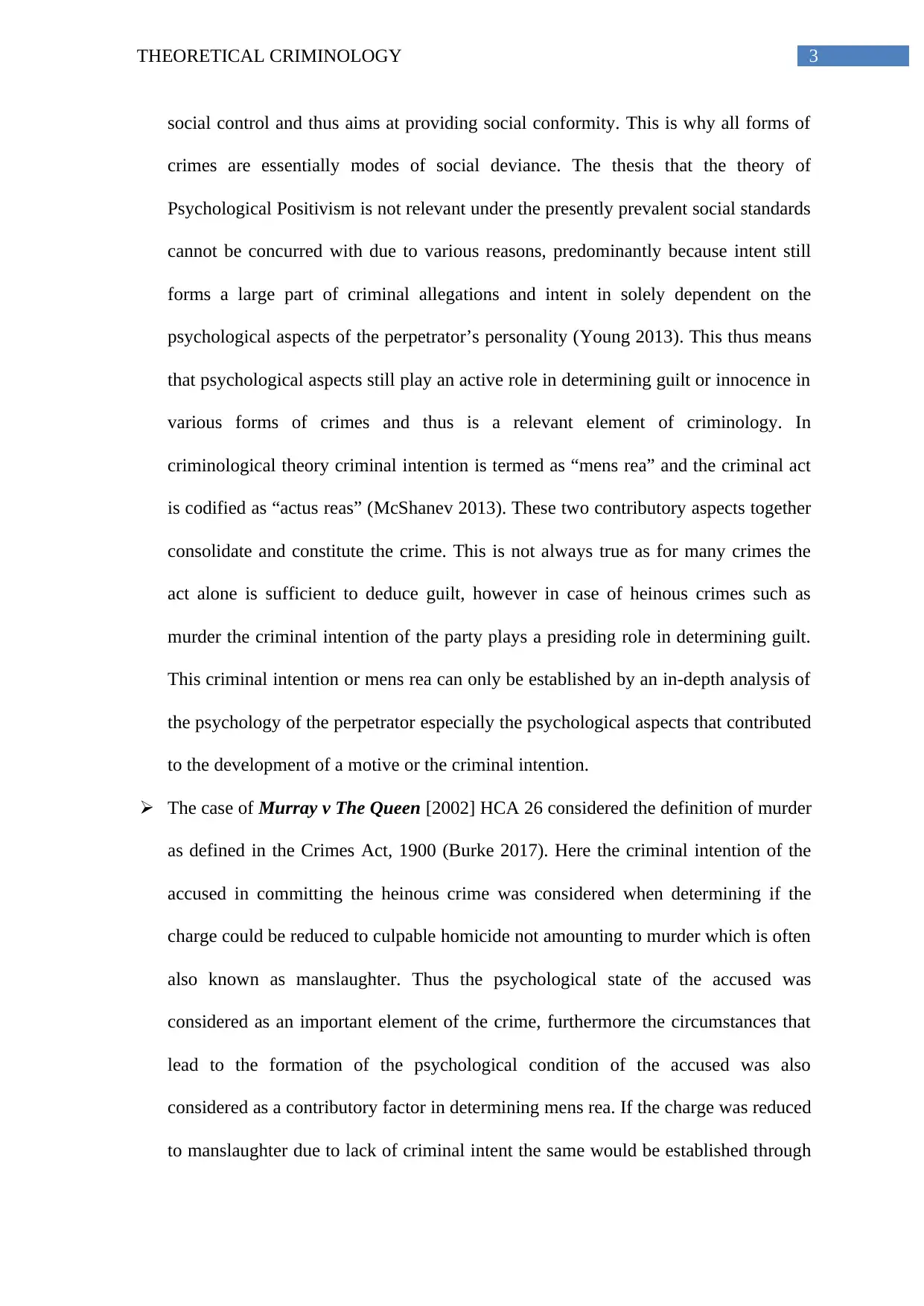
3THEORETICAL CRIMINOLOGY
social control and thus aims at providing social conformity. This is why all forms of
crimes are essentially modes of social deviance. The thesis that the theory of
Psychological Positivism is not relevant under the presently prevalent social standards
cannot be concurred with due to various reasons, predominantly because intent still
forms a large part of criminal allegations and intent in solely dependent on the
psychological aspects of the perpetrator’s personality (Young 2013). This thus means
that psychological aspects still play an active role in determining guilt or innocence in
various forms of crimes and thus is a relevant element of criminology. In
criminological theory criminal intention is termed as “mens rea” and the criminal act
is codified as “actus reas” (McShanev 2013). These two contributory aspects together
consolidate and constitute the crime. This is not always true as for many crimes the
act alone is sufficient to deduce guilt, however in case of heinous crimes such as
murder the criminal intention of the party plays a presiding role in determining guilt.
This criminal intention or mens rea can only be established by an in-depth analysis of
the psychology of the perpetrator especially the psychological aspects that contributed
to the development of a motive or the criminal intention.
The case of Murray v The Queen [2002] HCA 26 considered the definition of murder
as defined in the Crimes Act, 1900 (Burke 2017). Here the criminal intention of the
accused in committing the heinous crime was considered when determining if the
charge could be reduced to culpable homicide not amounting to murder which is often
also known as manslaughter. Thus the psychological state of the accused was
considered as an important element of the crime, furthermore the circumstances that
lead to the formation of the psychological condition of the accused was also
considered as a contributory factor in determining mens rea. If the charge was reduced
to manslaughter due to lack of criminal intent the same would be established through
social control and thus aims at providing social conformity. This is why all forms of
crimes are essentially modes of social deviance. The thesis that the theory of
Psychological Positivism is not relevant under the presently prevalent social standards
cannot be concurred with due to various reasons, predominantly because intent still
forms a large part of criminal allegations and intent in solely dependent on the
psychological aspects of the perpetrator’s personality (Young 2013). This thus means
that psychological aspects still play an active role in determining guilt or innocence in
various forms of crimes and thus is a relevant element of criminology. In
criminological theory criminal intention is termed as “mens rea” and the criminal act
is codified as “actus reas” (McShanev 2013). These two contributory aspects together
consolidate and constitute the crime. This is not always true as for many crimes the
act alone is sufficient to deduce guilt, however in case of heinous crimes such as
murder the criminal intention of the party plays a presiding role in determining guilt.
This criminal intention or mens rea can only be established by an in-depth analysis of
the psychology of the perpetrator especially the psychological aspects that contributed
to the development of a motive or the criminal intention.
The case of Murray v The Queen [2002] HCA 26 considered the definition of murder
as defined in the Crimes Act, 1900 (Burke 2017). Here the criminal intention of the
accused in committing the heinous crime was considered when determining if the
charge could be reduced to culpable homicide not amounting to murder which is often
also known as manslaughter. Thus the psychological state of the accused was
considered as an important element of the crime, furthermore the circumstances that
lead to the formation of the psychological condition of the accused was also
considered as a contributory factor in determining mens rea. If the charge was reduced
to manslaughter due to lack of criminal intent the same would be established through
Paraphrase This Document
Need a fresh take? Get an instant paraphrase of this document with our AI Paraphraser
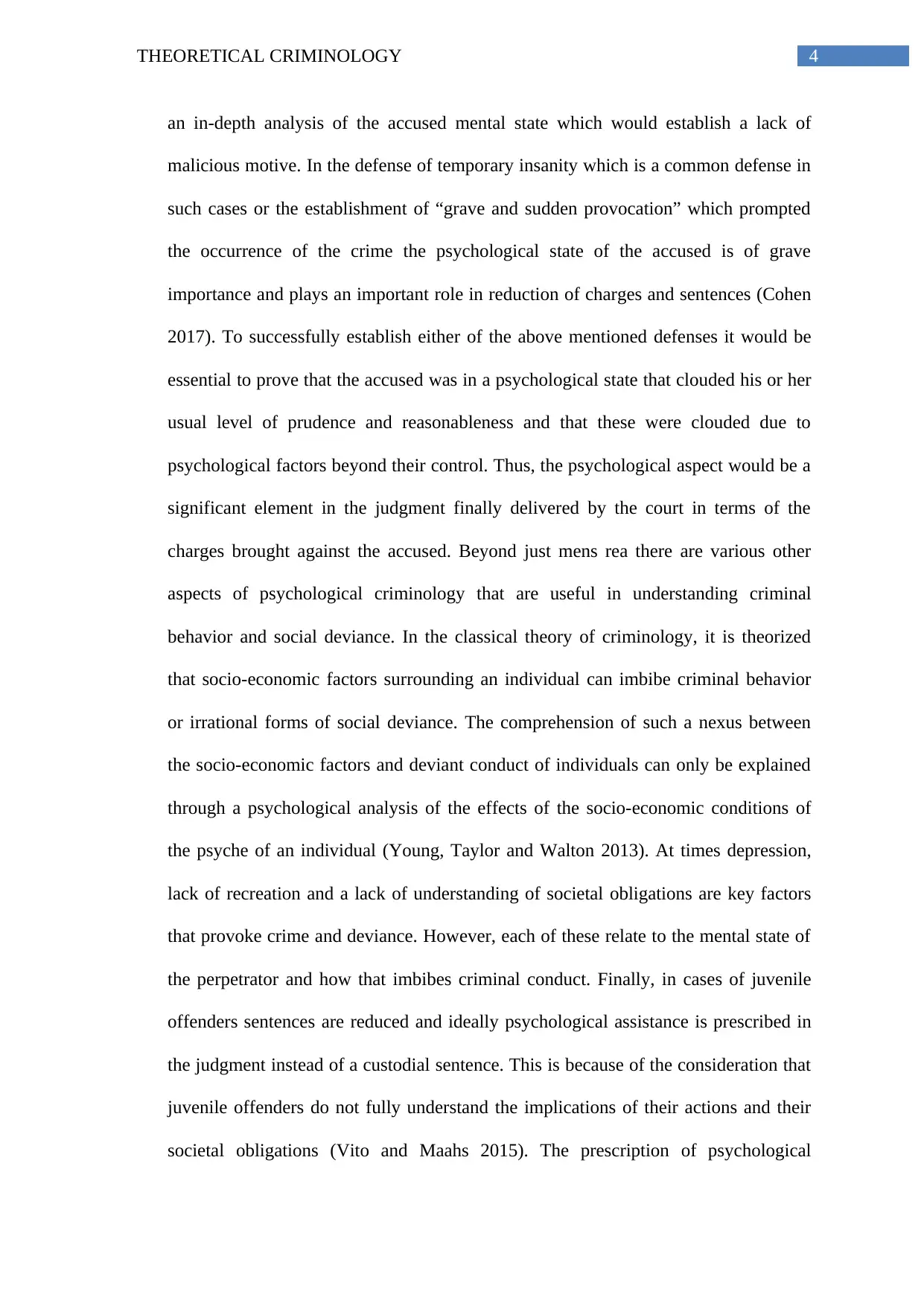
4THEORETICAL CRIMINOLOGY
an in-depth analysis of the accused mental state which would establish a lack of
malicious motive. In the defense of temporary insanity which is a common defense in
such cases or the establishment of “grave and sudden provocation” which prompted
the occurrence of the crime the psychological state of the accused is of grave
importance and plays an important role in reduction of charges and sentences (Cohen
2017). To successfully establish either of the above mentioned defenses it would be
essential to prove that the accused was in a psychological state that clouded his or her
usual level of prudence and reasonableness and that these were clouded due to
psychological factors beyond their control. Thus, the psychological aspect would be a
significant element in the judgment finally delivered by the court in terms of the
charges brought against the accused. Beyond just mens rea there are various other
aspects of psychological criminology that are useful in understanding criminal
behavior and social deviance. In the classical theory of criminology, it is theorized
that socio-economic factors surrounding an individual can imbibe criminal behavior
or irrational forms of social deviance. The comprehension of such a nexus between
the socio-economic factors and deviant conduct of individuals can only be explained
through a psychological analysis of the effects of the socio-economic conditions of
the psyche of an individual (Young, Taylor and Walton 2013). At times depression,
lack of recreation and a lack of understanding of societal obligations are key factors
that provoke crime and deviance. However, each of these relate to the mental state of
the perpetrator and how that imbibes criminal conduct. Finally, in cases of juvenile
offenders sentences are reduced and ideally psychological assistance is prescribed in
the judgment instead of a custodial sentence. This is because of the consideration that
juvenile offenders do not fully understand the implications of their actions and their
societal obligations (Vito and Maahs 2015). The prescription of psychological
an in-depth analysis of the accused mental state which would establish a lack of
malicious motive. In the defense of temporary insanity which is a common defense in
such cases or the establishment of “grave and sudden provocation” which prompted
the occurrence of the crime the psychological state of the accused is of grave
importance and plays an important role in reduction of charges and sentences (Cohen
2017). To successfully establish either of the above mentioned defenses it would be
essential to prove that the accused was in a psychological state that clouded his or her
usual level of prudence and reasonableness and that these were clouded due to
psychological factors beyond their control. Thus, the psychological aspect would be a
significant element in the judgment finally delivered by the court in terms of the
charges brought against the accused. Beyond just mens rea there are various other
aspects of psychological criminology that are useful in understanding criminal
behavior and social deviance. In the classical theory of criminology, it is theorized
that socio-economic factors surrounding an individual can imbibe criminal behavior
or irrational forms of social deviance. The comprehension of such a nexus between
the socio-economic factors and deviant conduct of individuals can only be explained
through a psychological analysis of the effects of the socio-economic conditions of
the psyche of an individual (Young, Taylor and Walton 2013). At times depression,
lack of recreation and a lack of understanding of societal obligations are key factors
that provoke crime and deviance. However, each of these relate to the mental state of
the perpetrator and how that imbibes criminal conduct. Finally, in cases of juvenile
offenders sentences are reduced and ideally psychological assistance is prescribed in
the judgment instead of a custodial sentence. This is because of the consideration that
juvenile offenders do not fully understand the implications of their actions and their
societal obligations (Vito and Maahs 2015). The prescription of psychological
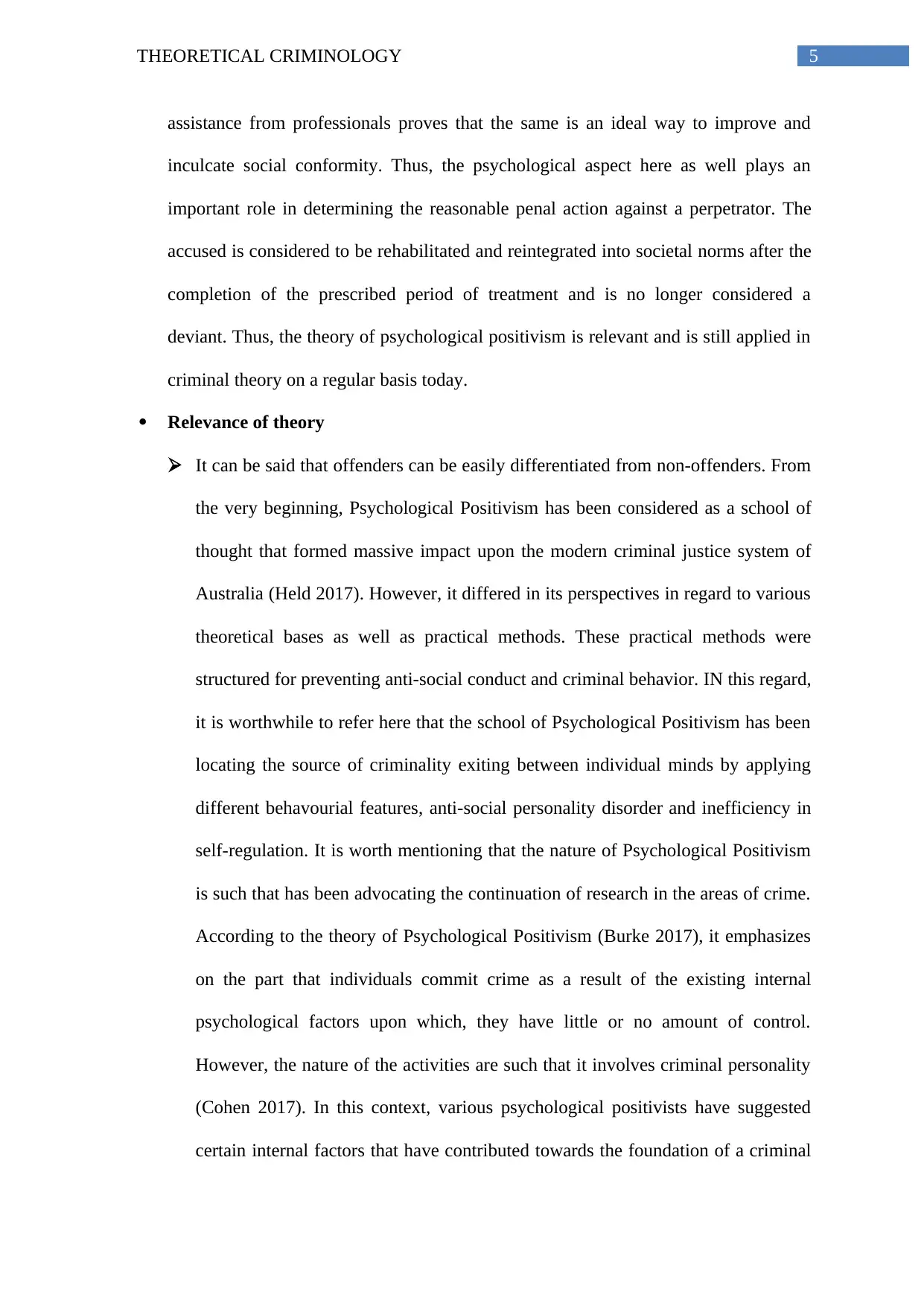
5THEORETICAL CRIMINOLOGY
assistance from professionals proves that the same is an ideal way to improve and
inculcate social conformity. Thus, the psychological aspect here as well plays an
important role in determining the reasonable penal action against a perpetrator. The
accused is considered to be rehabilitated and reintegrated into societal norms after the
completion of the prescribed period of treatment and is no longer considered a
deviant. Thus, the theory of psychological positivism is relevant and is still applied in
criminal theory on a regular basis today.
Relevance of theory
It can be said that offenders can be easily differentiated from non-offenders. From
the very beginning, Psychological Positivism has been considered as a school of
thought that formed massive impact upon the modern criminal justice system of
Australia (Held 2017). However, it differed in its perspectives in regard to various
theoretical bases as well as practical methods. These practical methods were
structured for preventing anti-social conduct and criminal behavior. IN this regard,
it is worthwhile to refer here that the school of Psychological Positivism has been
locating the source of criminality exiting between individual minds by applying
different behavourial features, anti-social personality disorder and inefficiency in
self-regulation. It is worth mentioning that the nature of Psychological Positivism
is such that has been advocating the continuation of research in the areas of crime.
According to the theory of Psychological Positivism (Burke 2017), it emphasizes
on the part that individuals commit crime as a result of the existing internal
psychological factors upon which, they have little or no amount of control.
However, the nature of the activities are such that it involves criminal personality
(Cohen 2017). In this context, various psychological positivists have suggested
certain internal factors that have contributed towards the foundation of a criminal
assistance from professionals proves that the same is an ideal way to improve and
inculcate social conformity. Thus, the psychological aspect here as well plays an
important role in determining the reasonable penal action against a perpetrator. The
accused is considered to be rehabilitated and reintegrated into societal norms after the
completion of the prescribed period of treatment and is no longer considered a
deviant. Thus, the theory of psychological positivism is relevant and is still applied in
criminal theory on a regular basis today.
Relevance of theory
It can be said that offenders can be easily differentiated from non-offenders. From
the very beginning, Psychological Positivism has been considered as a school of
thought that formed massive impact upon the modern criminal justice system of
Australia (Held 2017). However, it differed in its perspectives in regard to various
theoretical bases as well as practical methods. These practical methods were
structured for preventing anti-social conduct and criminal behavior. IN this regard,
it is worthwhile to refer here that the school of Psychological Positivism has been
locating the source of criminality exiting between individual minds by applying
different behavourial features, anti-social personality disorder and inefficiency in
self-regulation. It is worth mentioning that the nature of Psychological Positivism
is such that has been advocating the continuation of research in the areas of crime.
According to the theory of Psychological Positivism (Burke 2017), it emphasizes
on the part that individuals commit crime as a result of the existing internal
psychological factors upon which, they have little or no amount of control.
However, the nature of the activities are such that it involves criminal personality
(Cohen 2017). In this context, various psychological positivists have suggested
certain internal factors that have contributed towards the foundation of a criminal
⊘ This is a preview!⊘
Do you want full access?
Subscribe today to unlock all pages.

Trusted by 1+ million students worldwide
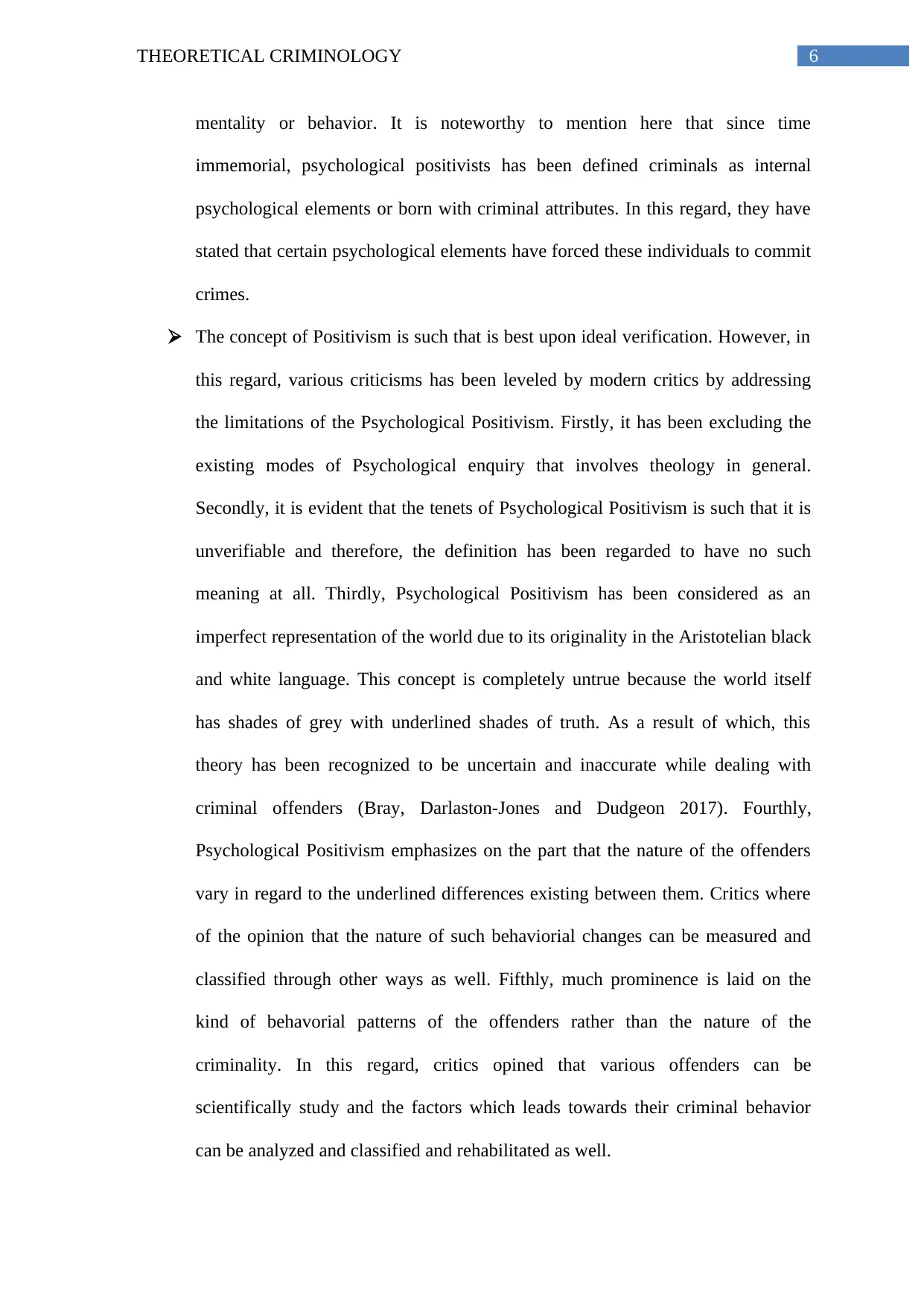
6THEORETICAL CRIMINOLOGY
mentality or behavior. It is noteworthy to mention here that since time
immemorial, psychological positivists has been defined criminals as internal
psychological elements or born with criminal attributes. In this regard, they have
stated that certain psychological elements have forced these individuals to commit
crimes.
The concept of Positivism is such that is best upon ideal verification. However, in
this regard, various criticisms has been leveled by modern critics by addressing
the limitations of the Psychological Positivism. Firstly, it has been excluding the
existing modes of Psychological enquiry that involves theology in general.
Secondly, it is evident that the tenets of Psychological Positivism is such that it is
unverifiable and therefore, the definition has been regarded to have no such
meaning at all. Thirdly, Psychological Positivism has been considered as an
imperfect representation of the world due to its originality in the Aristotelian black
and white language. This concept is completely untrue because the world itself
has shades of grey with underlined shades of truth. As a result of which, this
theory has been recognized to be uncertain and inaccurate while dealing with
criminal offenders (Bray, Darlaston-Jones and Dudgeon 2017). Fourthly,
Psychological Positivism emphasizes on the part that the nature of the offenders
vary in regard to the underlined differences existing between them. Critics where
of the opinion that the nature of such behaviorial changes can be measured and
classified through other ways as well. Fifthly, much prominence is laid on the
kind of behavorial patterns of the offenders rather than the nature of the
criminality. In this regard, critics opined that various offenders can be
scientifically study and the factors which leads towards their criminal behavior
can be analyzed and classified and rehabilitated as well.
mentality or behavior. It is noteworthy to mention here that since time
immemorial, psychological positivists has been defined criminals as internal
psychological elements or born with criminal attributes. In this regard, they have
stated that certain psychological elements have forced these individuals to commit
crimes.
The concept of Positivism is such that is best upon ideal verification. However, in
this regard, various criticisms has been leveled by modern critics by addressing
the limitations of the Psychological Positivism. Firstly, it has been excluding the
existing modes of Psychological enquiry that involves theology in general.
Secondly, it is evident that the tenets of Psychological Positivism is such that it is
unverifiable and therefore, the definition has been regarded to have no such
meaning at all. Thirdly, Psychological Positivism has been considered as an
imperfect representation of the world due to its originality in the Aristotelian black
and white language. This concept is completely untrue because the world itself
has shades of grey with underlined shades of truth. As a result of which, this
theory has been recognized to be uncertain and inaccurate while dealing with
criminal offenders (Bray, Darlaston-Jones and Dudgeon 2017). Fourthly,
Psychological Positivism emphasizes on the part that the nature of the offenders
vary in regard to the underlined differences existing between them. Critics where
of the opinion that the nature of such behaviorial changes can be measured and
classified through other ways as well. Fifthly, much prominence is laid on the
kind of behavorial patterns of the offenders rather than the nature of the
criminality. In this regard, critics opined that various offenders can be
scientifically study and the factors which leads towards their criminal behavior
can be analyzed and classified and rehabilitated as well.
Paraphrase This Document
Need a fresh take? Get an instant paraphrase of this document with our AI Paraphraser
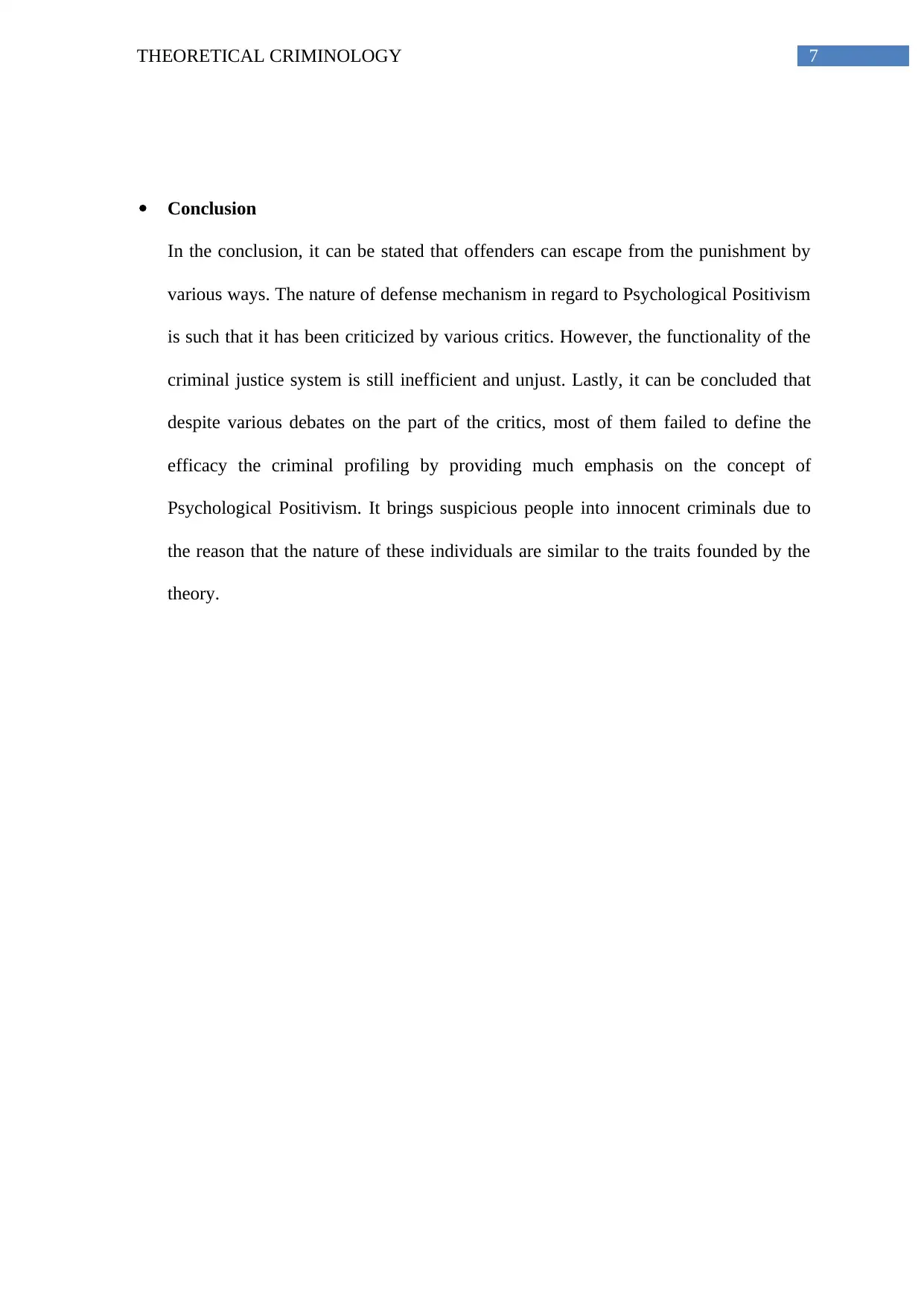
7THEORETICAL CRIMINOLOGY
Conclusion
In the conclusion, it can be stated that offenders can escape from the punishment by
various ways. The nature of defense mechanism in regard to Psychological Positivism
is such that it has been criticized by various critics. However, the functionality of the
criminal justice system is still inefficient and unjust. Lastly, it can be concluded that
despite various debates on the part of the critics, most of them failed to define the
efficacy the criminal profiling by providing much emphasis on the concept of
Psychological Positivism. It brings suspicious people into innocent criminals due to
the reason that the nature of these individuals are similar to the traits founded by the
theory.
Conclusion
In the conclusion, it can be stated that offenders can escape from the punishment by
various ways. The nature of defense mechanism in regard to Psychological Positivism
is such that it has been criticized by various critics. However, the functionality of the
criminal justice system is still inefficient and unjust. Lastly, it can be concluded that
despite various debates on the part of the critics, most of them failed to define the
efficacy the criminal profiling by providing much emphasis on the concept of
Psychological Positivism. It brings suspicious people into innocent criminals due to
the reason that the nature of these individuals are similar to the traits founded by the
theory.
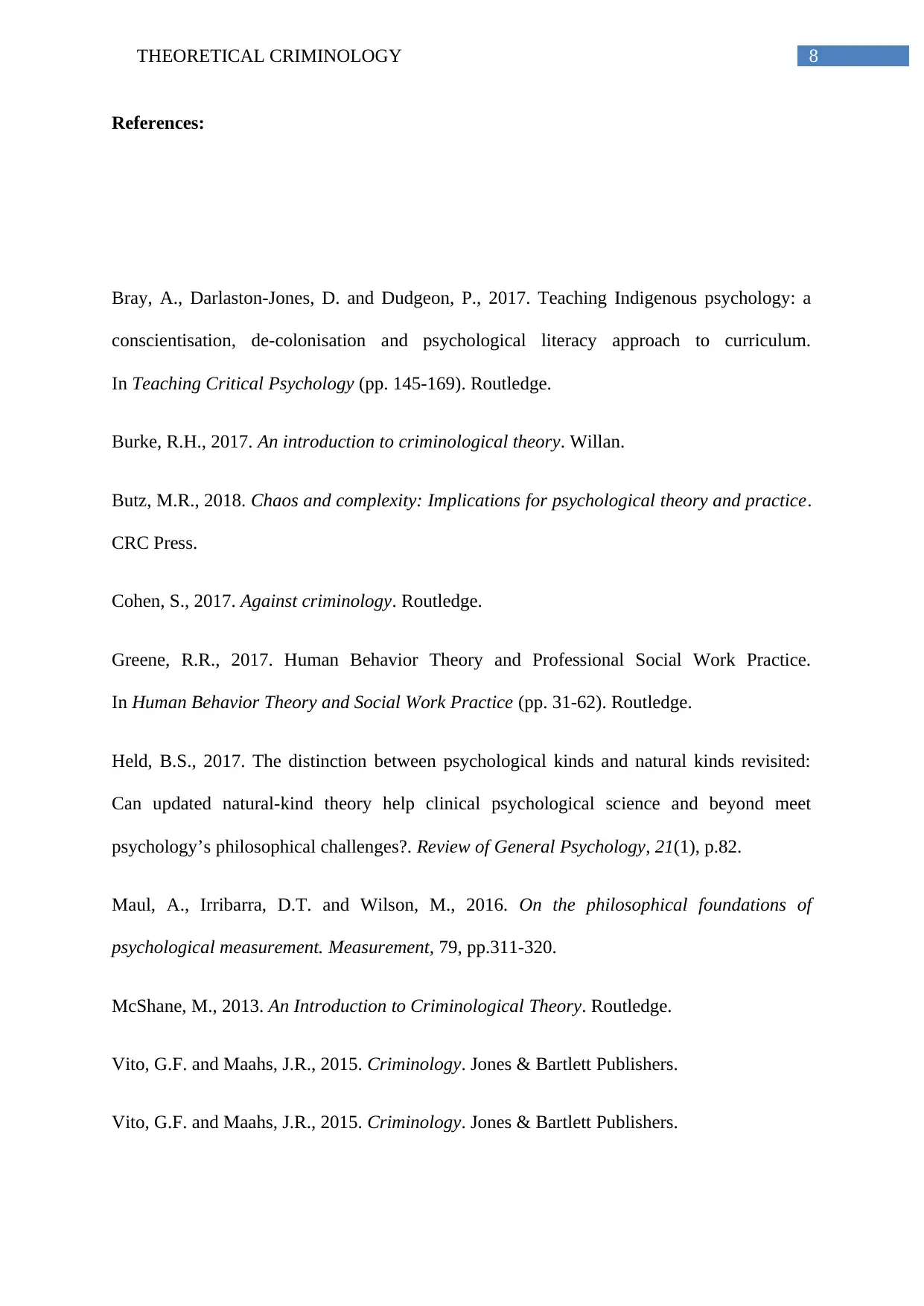
8THEORETICAL CRIMINOLOGY
References:
Bray, A., Darlaston-Jones, D. and Dudgeon, P., 2017. Teaching Indigenous psychology: a
conscientisation, de-colonisation and psychological literacy approach to curriculum.
In Teaching Critical Psychology (pp. 145-169). Routledge.
Burke, R.H., 2017. An introduction to criminological theory. Willan.
Butz, M.R., 2018. Chaos and complexity: Implications for psychological theory and practice.
CRC Press.
Cohen, S., 2017. Against criminology. Routledge.
Greene, R.R., 2017. Human Behavior Theory and Professional Social Work Practice.
In Human Behavior Theory and Social Work Practice (pp. 31-62). Routledge.
Held, B.S., 2017. The distinction between psychological kinds and natural kinds revisited:
Can updated natural-kind theory help clinical psychological science and beyond meet
psychology’s philosophical challenges?. Review of General Psychology, 21(1), p.82.
Maul, A., Irribarra, D.T. and Wilson, M., 2016. On the philosophical foundations of
psychological measurement. Measurement, 79, pp.311-320.
McShane, M., 2013. An Introduction to Criminological Theory. Routledge.
Vito, G.F. and Maahs, J.R., 2015. Criminology. Jones & Bartlett Publishers.
Vito, G.F. and Maahs, J.R., 2015. Criminology. Jones & Bartlett Publishers.
References:
Bray, A., Darlaston-Jones, D. and Dudgeon, P., 2017. Teaching Indigenous psychology: a
conscientisation, de-colonisation and psychological literacy approach to curriculum.
In Teaching Critical Psychology (pp. 145-169). Routledge.
Burke, R.H., 2017. An introduction to criminological theory. Willan.
Butz, M.R., 2018. Chaos and complexity: Implications for psychological theory and practice.
CRC Press.
Cohen, S., 2017. Against criminology. Routledge.
Greene, R.R., 2017. Human Behavior Theory and Professional Social Work Practice.
In Human Behavior Theory and Social Work Practice (pp. 31-62). Routledge.
Held, B.S., 2017. The distinction between psychological kinds and natural kinds revisited:
Can updated natural-kind theory help clinical psychological science and beyond meet
psychology’s philosophical challenges?. Review of General Psychology, 21(1), p.82.
Maul, A., Irribarra, D.T. and Wilson, M., 2016. On the philosophical foundations of
psychological measurement. Measurement, 79, pp.311-320.
McShane, M., 2013. An Introduction to Criminological Theory. Routledge.
Vito, G.F. and Maahs, J.R., 2015. Criminology. Jones & Bartlett Publishers.
Vito, G.F. and Maahs, J.R., 2015. Criminology. Jones & Bartlett Publishers.
⊘ This is a preview!⊘
Do you want full access?
Subscribe today to unlock all pages.

Trusted by 1+ million students worldwide
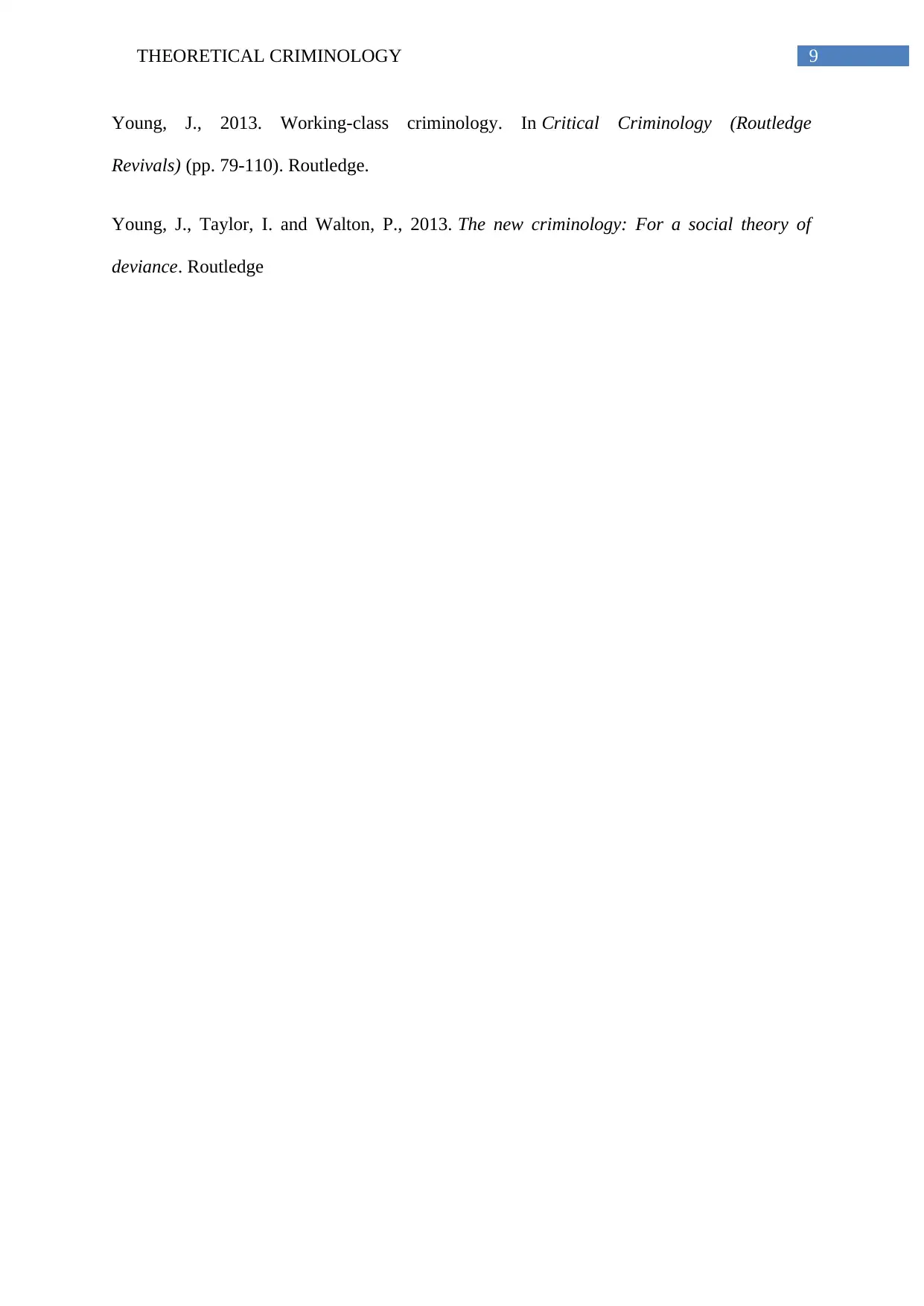
9THEORETICAL CRIMINOLOGY
Young, J., 2013. Working-class criminology. In Critical Criminology (Routledge
Revivals) (pp. 79-110). Routledge.
Young, J., Taylor, I. and Walton, P., 2013. The new criminology: For a social theory of
deviance. Routledge
Young, J., 2013. Working-class criminology. In Critical Criminology (Routledge
Revivals) (pp. 79-110). Routledge.
Young, J., Taylor, I. and Walton, P., 2013. The new criminology: For a social theory of
deviance. Routledge
1 out of 10
Related Documents
Your All-in-One AI-Powered Toolkit for Academic Success.
+13062052269
info@desklib.com
Available 24*7 on WhatsApp / Email
![[object Object]](/_next/static/media/star-bottom.7253800d.svg)
Unlock your academic potential
Copyright © 2020–2026 A2Z Services. All Rights Reserved. Developed and managed by ZUCOL.





